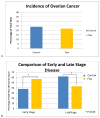Decreased severity of ovarian cancer and increased survival in hens fed a flaxseed-enriched diet for 1 year
- PMID: 20153884
- PMCID: PMC2849883
- DOI: 10.1016/j.ygyno.2010.01.021
Decreased severity of ovarian cancer and increased survival in hens fed a flaxseed-enriched diet for 1 year
Abstract
Objective: With the exception of the laying hen, no other animal model of spontaneous ovarian surface epithelial cancer replicates the human disease. Flaxseed is the richest vegetable source of omega-3 fatty acids, which are chemopreventive in breast cancer and may be important in other cancers. The objective of this study was to determine if a flaxseed-enriched diet had a chemopreventive effect on ovarian cancer in the laying hen.
Methods: White Leghorn hens were fed with 10% flaxseed-enriched or standard diet for 1 year. The incidence and severity of ovarian cancer were determined by gross pathology and histology in the two groups. General health markers were also measured. Eggs were collected and analyzed by gas chromatography to determine omega-3 fatty acid levels.
Results: A significant reduction in late stage ovarian tumors was detected in the flaxseed-fed hens. Incidence rates of ovarian cancer were not significantly different between the two groups. The results indicate that a flaxseed diet increases overall survival in the laying hen. Flaxseed-fed hens' eggs incorporated significantly more omega-3 fatty acids compared to control hens.
Conclusions: These findings show that 10% flaxseed supplementation for 1 year in the laying hen results in a significant reduction in the severity of ovarian cancer, but no change in the incidence of the disease. Hens fed flaxseed had overall better health and reduced mortality. These findings may provide the basis for a clinical trial that evaluates the efficacy of flaxseed as a chemosuppressant of ovarian cancer in women.
Copyright (c) 2009 Elsevier Inc. All rights reserved.
Conflict of interest statement
The authors declare that there are no conflicts of interest.
Figures





Similar articles
-
Flaxseed enriched diet-mediated reduction in ovarian cancer severity is correlated to the reduction of prostaglandin E(2) in laying hen ovaries.Prostaglandins Leukot Essent Fatty Acids. 2013 Sep;89(4):179-87. doi: 10.1016/j.plefa.2013.08.001. Epub 2013 Aug 14. Prostaglandins Leukot Essent Fatty Acids. 2013. PMID: 23978451 Free PMC article. Clinical Trial.
-
Long term consumption of flaxseed enriched diet decreased ovarian cancer incidence and prostaglandin E₂in hens.Gynecol Oncol. 2013 Sep;130(3):620-8. doi: 10.1016/j.ygyno.2013.05.018. Epub 2013 May 23. Gynecol Oncol. 2013. PMID: 23707669 Free PMC article.
-
Choline and methionine supplementation in layer hens fed flaxseed: effects on hen production performance, egg fatty acid composition, tocopherol content, and oxidative stability.Poult Sci. 2021 Sep;100(9):101299. doi: 10.1016/j.psj.2021.101299. Epub 2021 May 29. Poult Sci. 2021. PMID: 34271229 Free PMC article.
-
Production of Bio-omega-3 eggs through the supplementation of extruded flaxseed meal in hen diet.Lipids Health Dis. 2015 Oct 9;14:126. doi: 10.1186/s12944-015-0127-x. Lipids Health Dis. 2015. PMID: 26453429 Free PMC article.
-
Comparative omega-3 fatty acid enrichment of egg yolks from first-cycle laying hens fed flaxseed oil or ground flaxseed.Poult Sci. 2017 Jun 1;96(6):1791-1799. doi: 10.3382/ps/pew462. Poult Sci. 2017. PMID: 28108729 Free PMC article.
Cited by
-
Flaxseed reduces the pro-carcinogenic micro-environment in the ovaries of normal hens by altering the PG and oestrogen pathways in a dose-dependent manner.Br J Nutr. 2015 May 14;113(9):1384-95. doi: 10.1017/S000711451500029X. Epub 2015 Apr 8. Br J Nutr. 2015. PMID: 25850566 Free PMC article.
-
The pro-apoptotic actions of 2-methoxyestradiol against ovarian cancer involve catalytic activation of PKCδ signaling.Oncotarget. 2020 Oct 6;11(40):3646-3659. doi: 10.18632/oncotarget.27760. eCollection 2020 Oct 6. Oncotarget. 2020. PMID: 33088425 Free PMC article.
-
Influence of Zeolite on fatty acid composition and egg quality in Tunisian Laying Hens.Lipids Health Dis. 2012 Jun 7;11:71. doi: 10.1186/1476-511X-11-71. Lipids Health Dis. 2012. PMID: 22676421 Free PMC article.
-
Age dependent increase in prostaglandin pathway coincides with onset of ovarian cancer in laying hens.Prostaglandins Leukot Essent Fatty Acids. 2012 Dec;87(6):177-84. doi: 10.1016/j.plefa.2012.09.003. Epub 2012 Oct 23. Prostaglandins Leukot Essent Fatty Acids. 2012. PMID: 23089186 Free PMC article.
-
Anti-Oxidant and Anti-Cancer Properties of Flaxseed.Int J Mol Sci. 2025 Jan 30;26(3):1226. doi: 10.3390/ijms26031226. Int J Mol Sci. 2025. PMID: 39940995 Free PMC article. Review.
References
-
- Lu KH, Yates MS, Mok SC. The monkey, the hen, and the mouse: models to advance ovarian cancer chemoprevention. Cancer Prev Res (Phila Pa) 2009;2(9):773–5. - PubMed
-
- WCRF/AICR. Food, nutrition and the prevention of cancer: a global perspective. World Cancer Research Fund/American Institute for Cancer Research; 1997. - PubMed
-
- Omega-3 Fatty Acids. 2008. [cited; Available from: http://www.umm.edu/altmed/articles/omega-3-000316.htm.
-
- Rose DP, Connolly JM. Omega-3 fatty acids as cancer chemopreventive agents. Pharmacol Ther. 1999;83(3):217–44. - PubMed
Publication types
MeSH terms
Substances
Grants and funding
LinkOut - more resources
Full Text Sources
Medical

